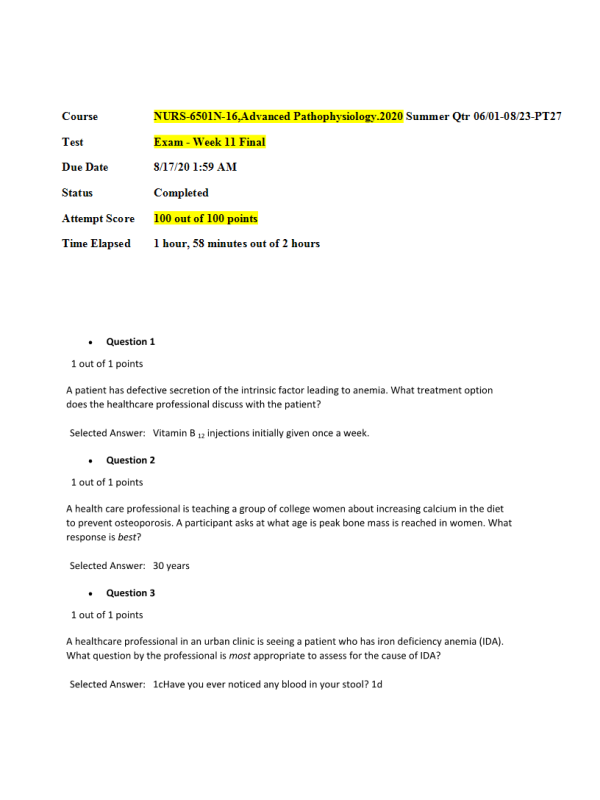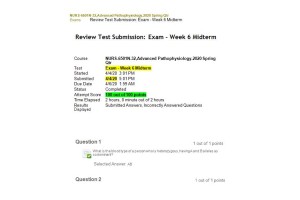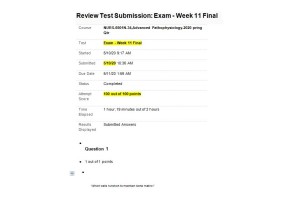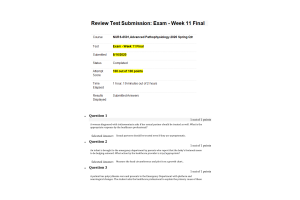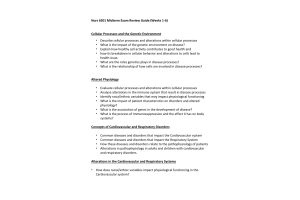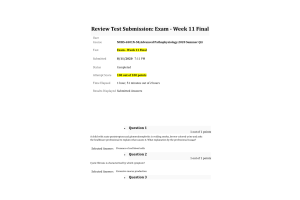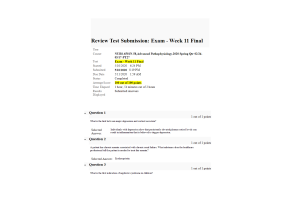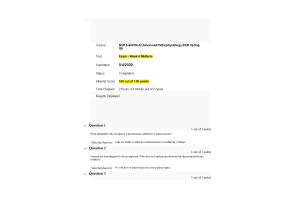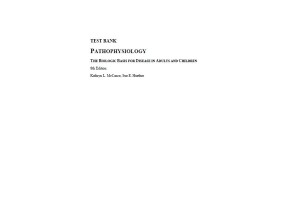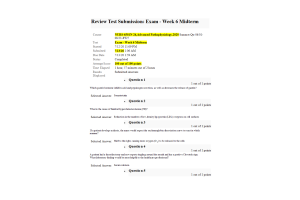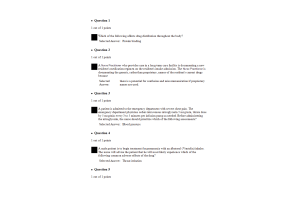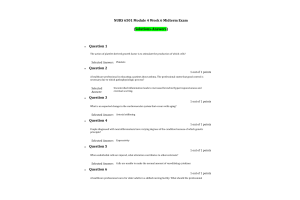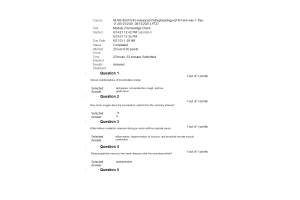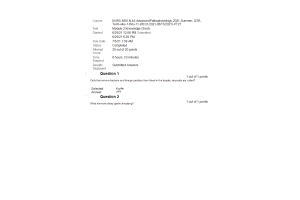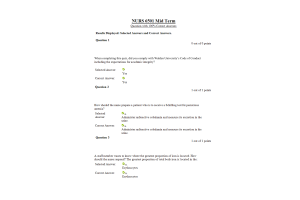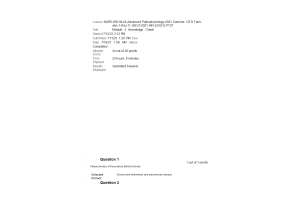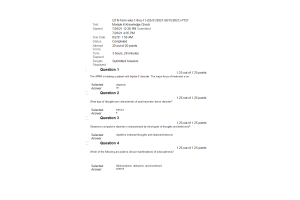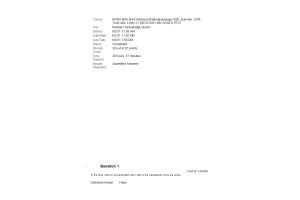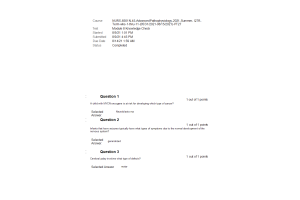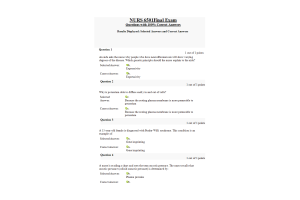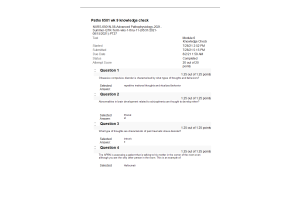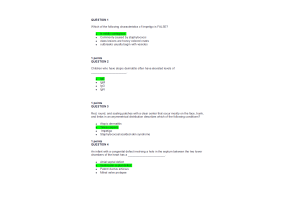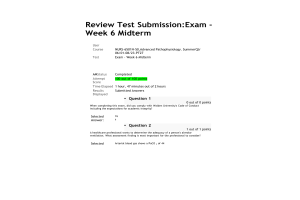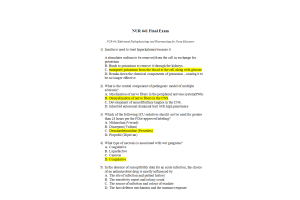NURS 6501N-16, Advanced Pathophysiology; Week 11 Final Exam
- $39.00
- Question: A patient has defective secretion of the intrinsic factor leading to anemia. What treatment option does the healthcare professional discuss with the patient?
- Question: A health care professional is teaching a group of college women about increasing calcium in the diet to prevent osteoporosis. A participant asks at what age is peak bone mass is reached in women. What response is best?
- Question: A healthcare professional in an urban clinic is seeing a patient who has iron deficiency anemia (IDA). What question by the professional is most appropriate to assess for the cause of IDA?
- Question: How should the healthcare professional reply when parents question why a computed tomographic (CT) scan of the head was not ordered for their 5-year-old child after a minor fall?
- Question: A health care professional determines that the student needs more education when the student makes which statement about treating bone infection?
- Question: Which statement by the professor best describes acute respiratory distress syndrome (ARDS)?
- Question: What is the effect of low plasma albumin?
- Question: A patient has been hospitalized with Guillain-Barré syndrome (GBS). The patient asks how this could have occurred. What response by the healthcare professional is best?
- Question: A student reads in a chart that a child has been diagnosed with mixed precocious puberty and asks for an explanation. What explanation by the healthcare professional is most accurate?
- Question: A student reads in a chart that a child has been diagnosed with mixed precocious puberty and asks for an explanation. What explanation by the healthcare professional is most accurate?
- Question: Hypothalamic-pituitary-adrenal (HPA) system abnormalities exist in a large percentage of individuals with what?
- Question: Which statement by the healthcare professional accurately describes childhood asthma?
- Question: What does the student learn distinguishes kwashiorkor from marasmus?
- Question: A patient has primary immune thrombocytopenic purpura (ITP) and is hospitalized after a bleeding episode. What treatment does the healthcare provider anticipate being ordered for this patient?
- Question: A man reports to the healthcare professional that he had a sudden onset of malaise, low back pain, and perineal pain with high fever and chills, dysuria, nocturia, and urinary retention. What action by the healthcare professional is most appropriate?
- Question: What is the role of thromboxane A (TXA 2) in the secretion stage of hemostasis?
- Question: A woman who is positive for hepatitis B is in labor. What action by the healthcare professional is most appropriate?
- Question: A person has been diagnosed with primary dysmenorrhea and wants to know why ibuprofen is a good choice for pain control. What response by the health care professional is best?
- Question: A preschool teacher notices a child who has burrows on the hands that are several millimeters to 1 cm long, papules, and vesicular lesions. What other assessment finding would help the teacher determine the type of infestation the child has?
- Question: Compared with an adult, an infant has a greater content of extracellular fluid, as well as a greater rate of fluid exchange. What effect does this have on the fluid balance of a child compared with that of an adult?
- Question: A healthcare professional is caring for a patient who has a spinal cord injury at T5. The patient exhibits severe hypertension, a heart rate of 32 beats/min, and sweating above the spinal cord lesion. How does the professional chart this event?
- Question: Which condition is consistent with the cardiac defect of transposition of the great vessels?
- Question: What directly causes ovulation during the menstrual cycle?
- Question: A healthcare professional is caring for a patient diagnosed with aphasia. What action by the professional would be best in working with this patient?
- Question: A professor explains to a class that the reason lymph nodes enlarge and become tender during infection is because of what reason?
- Question: How does the epididymis become infected?
- Question: In acute hypothermia, what physiologic change shunts blood away from the colder skin to the body core in an effort to decrease heat loss?
- Question: Which spinal tract carries the most nociceptive information?
- Question: Which statement is likely true regarding children being treated for cancer with radiation therapy?
- Question: A health care professional is caring for a patient admitted to the hospital with severe anorexia. What action by the health care professional would be most important?
- Question: A healthcare professional is trying to lower a patient's body temperature by convection. What action by the professional will accomplish this?
- Question: A parent asks the healthcare professional to explain why a child diagnosed with Tetralogy of Fallot squats frequently. What explanation by the professional is best?
- Question: An infant has gluten-sensitive enteropathy and the parents ask the healthcare professional to explain why the baby bruises so easily. The professional explains that the baby has which deficit?
- Question: A woman has been diagnosed with polycystic ovary syndrome but is confused because her pelvic ultrasound (US) was read as normal and did not show cysts. What response by the health care professional is most appropriate?
- Question: A student is learning about pelvic inflammatory disease (PID). What information does the student clarify with a study partner as being correct?
- Question: A patient in the healthcare clinic reports fatigue, weakness, and dyspnea, as well as pale conjunctiva of the eyes and brittle, concave nails. What assessment by the healthcare professional is most appropriate for the suspected anemia?
- Question: A patient is in the intensive care unit and has intercranial pressure (ICP) monitoring. The patient's ICP is 17 mmHg. The healthcare professional notes that the chart indicates the patient is now in stage 1 intracranial hypertension. What assessment finding does the professional associate with this condition?
- Question: What is the most abundant class of plasma protein?
- Question: What is the primary cause of respiratory distress syndrome (RDS) of the newborn?
- Question: What are the clinical manifestations of testicular cancer?
- Question: A patient in the hospital has been receiving heparin injections. The platelet count on admission was 222,000/mm 3 and four days later is 113,000/mm 3. What action by the healthcare professional is best?
- Question: A patient has a spinal cord injury at C4. What should the healthcare professional assess as the priority in this patient?
- Question: A parent brings a 10-year-old child to the clinic and reports a mottled appearance to the skin and legs cramps when the child is in physical education class. Physical assessment positive for upper extremity hypertension. What diagnostic testing or treatment does the healthcare professional prepare the family for?
- Question: Which mother does the healthcare professional prepare to administer Rh immune globulin (Rho-GAM) to?
- Question: A student asks the professor what the most common pathophysiologic process is that triggers aplastic anemia (AA). What response by the professor is most accurate?
- Question: The healthcare professor states that a patient has reached pain tolerance. What further information from the professor is most accurate?
- Question: A healthcare professional is caring for a patient who was rewarmed after suffering from hypothermia. What possible long-term complication will the professional continue to assess the patient for?
- Question: Which pain theory proposes that a balance of impulses conducted from the spinal cord to the higher centers in the central nervous system (CNS) modulates the transmission of pain?
- Question: In the majority of children experiencing delayed puberty, what is the problem caused by?
- Question: Without prior exposure to an antigen, which cells are able to destroy some types of tumor cells and some virus-infected cells?
- Question: What congenital malformation is commonly linked to acute leukemia in children?
- Question: A healthcare professional had taught a pregnant woman about the risk of transmitting herpes simplex virus (HSV) from her to her fetus. What statement by the woman indicates the professional needs to provide more information?
- Question: Which hospitalized patient does the healthcare professional assess as a priority for the development of delirium?
- Question: A student asks the professor to explain the jaundice that accompanies hemolytic anemia. Which statement is by the professor is most accurate?
- Question: A severely malnourished patient is in the hospital to improve nutrition. On the second day, the patient reports palpitations and difficulty breathing. After placing the patient on a cardiac monitor, what action does the health care professional take next?
- Question: A child has iron deficiency anemia. In addition to iron supplements, what else does the healthcare professional educate the parents on giving the child?
- Question: A newborn baby displays jaundice 20 hours after birth. What action by the healthcare professional is most appropriate?
- Question: What initiates inflammation in acute poststreptococcal glomerulonephritis?
- Question: What initiates inflammation in acute poststreptococcal glomerulonephritis?
- Question: What diagnosis is given to parents when their infant's hip maintains contact with the acetabulum but is not well seated within the hip joint?
- Question: Which patient finding would lead the health care professional to assess the patient for inflammatory joint disease?
- Question: A healthcare professional suspects a patient is brain dead. How would the professional assess for brain death?
- Question: A healthcare professional suspects a patient is brain dead. How would the professional assess for brain death?
- Question: A healthcare professional is teaching a community group about inherited disorders. What pattern of inheritance does the professional describe for sickle cell disease?
- Question: Bronchiolitis tends to occur during the first years of life and is most often caused by what type of infection?
- Question: Bronchiolitis tends to occur during the first years of life and is most often caused by what type of infection?
- Question: A patient has hepatomegaly, bronze-colored skin, and cardiac dysrhythmias. What condition does the healthcare professional prepare to teach the patient about?
- Question: A student asks the healthcare professional why researchers are trying to link specific genes to specific asthma phenotypes. What response by the professional is best?
- Question: Prenatal exposure to diethylstilbestrol (DES) can result in which type of cancer?
- Question: The student asks the professor for a definition of orexigenic neurons. What description by the professor is most accurate?
- Question: A child has phenylketonuria (PKU). The healthcare professional educates the parents on the special diet needed, telling them that children with PKU are unable to synthesize what?
- Question: A patient has a temporary displacement of two bones in a joint causing the bone surfaces to partially lose contact with each other. What treatment does the health care professional prepare the patient for?
- Question: A patient has polycythemia vera and presents to the Emergency Department with plethora and neurological changes. The student asks the healthcare professional to explain the primary cause of these symptoms. What response by the professional is best?
- Question: The healthcare professional directs a student to assess a teen who has Osgood-Schlatter disease. What assessment finding does the student anticipate for this disorder?
- Question: An infant has a continuous machine-type murmur best heard at the left upper sternal border throughout systole and diastole. The healthcare professional suspects a congenital heart disorder. What other assessment finding is inconsistent with the professional's knowledge about this disorder?
- Question: An infant is brought to the emergency department by parents who report that the baby's fontanels seem to be bulging outward. What action by the healthcare provider is most appropriate?
- Question: A person has abnormally severe tooth decay and erosion of the tooth enamel. What problem should the health care professional assess the person for?
- Question: A person has a vascular anomaly associated with a congenital malformation of dermal capillaries and has been told this lesion does not fade with age. What treatment options can the healthcare professional discuss with this person?
- Question: How is gonorrhea transmitted from a pregnant woman to her fetus?
- Question: How is gonorrhea transmitted from a pregnant woman to her fetus?
- Question: The disruption in cellular adhesion observed in bullous impetigo is caused by an exfoliative toxin related to which organism?
- Question: A child with acute poststreptococcal glomerulonephritis is voiding smoky, brown-colored urine and asks the healthcare professional to explain what causes it. What explanation by the professional is best?
- Question: A man has balanitis. What action by the healthcare professional is most appropriate?
- Question: A man has balanitis. What action by the healthcare professional is most appropriate?
- Question: Clinical manifestations that include irregular or heavy bleeding, the passage of large clots, and the depletion of iron stores support which diagnosis?
- Question: Which immunoglobulin (Ig) is present in childhood asthma?
- Question: A patient is in the Emergency Department with heat stroke. What finding does the healthcare provider associate with this condition?
- Question: A mother reports that her young teens have voracious appetites. The healthcare professional would explain that which hormone is linked to an increase in appetite during puberty?
- Question: A healthcare professional is reviewing a patient's laboratory results and sees that the patient has a low reticulocyte count and a high iron level. Which type of anemia does the professional associate these findings with?
- Question: An adult patient has been hospitalized with thrombocytopenia with a platelet count of 8000/mm 3. What action by the healthcare professional is most appropriate?
- Question: The student wants to know how the clinical manifestations and onset of juvenile idiopathic arthritis (JIA) differ from those of rheumatoid arthritis (RA) in adults. What answer by the healthcare professional is best?
- Question: Parents report their 3-week-old infant who eats well and has gained weight began to have projectile vomiting for no apparent reason. What treatment option does the healthcare professional prepare to educate the parents on?
- Question: A patient has been exposed to prolonged high environmental temperatures and now shows signs of dehydration, decreased plasma volumes, hypotension, decreased cardiac output, and tachycardia. What treatment does the healthcare professional prepare to administer to this patient?
- Question: A patient is 8 hours postoperative after a long orthopedic procedure. The student asks why this patient is at particular risk of developing a thromboembolism. What response by the healthcare professional is best?
- Question: A patient is admitted to the hospital with multiple myeloma (MM). Which diagnostic test should the healthcare professional assess as the priority?
- Question: To quickly assess a patient's nervous system for dysfunction, what assessment should the healthcare professional perform as the priority?
- Question: A patient has pernicious anemia and asks the healthcare professional to explain the disease. Which statement by the professional is most accurate?
- Question: A patient had a seizure that consisted of impaired consciousness and the appearance of a dreamlike state. How does the healthcare professional chart this episode?
- Question: Local signs and symptoms of Hodgkin disease-related lymphadenopathy are a result of what?
- Question: In order to help prevent a preadolescent girl from developing later cervical cancer, which virus does the healthcare professional recommend vaccination against to the parent?
- Question: In order to help prevent a preadolescent girl from developing later cervical cancer, which virus does the healthcare professional recommend vaccination against to the parent?
